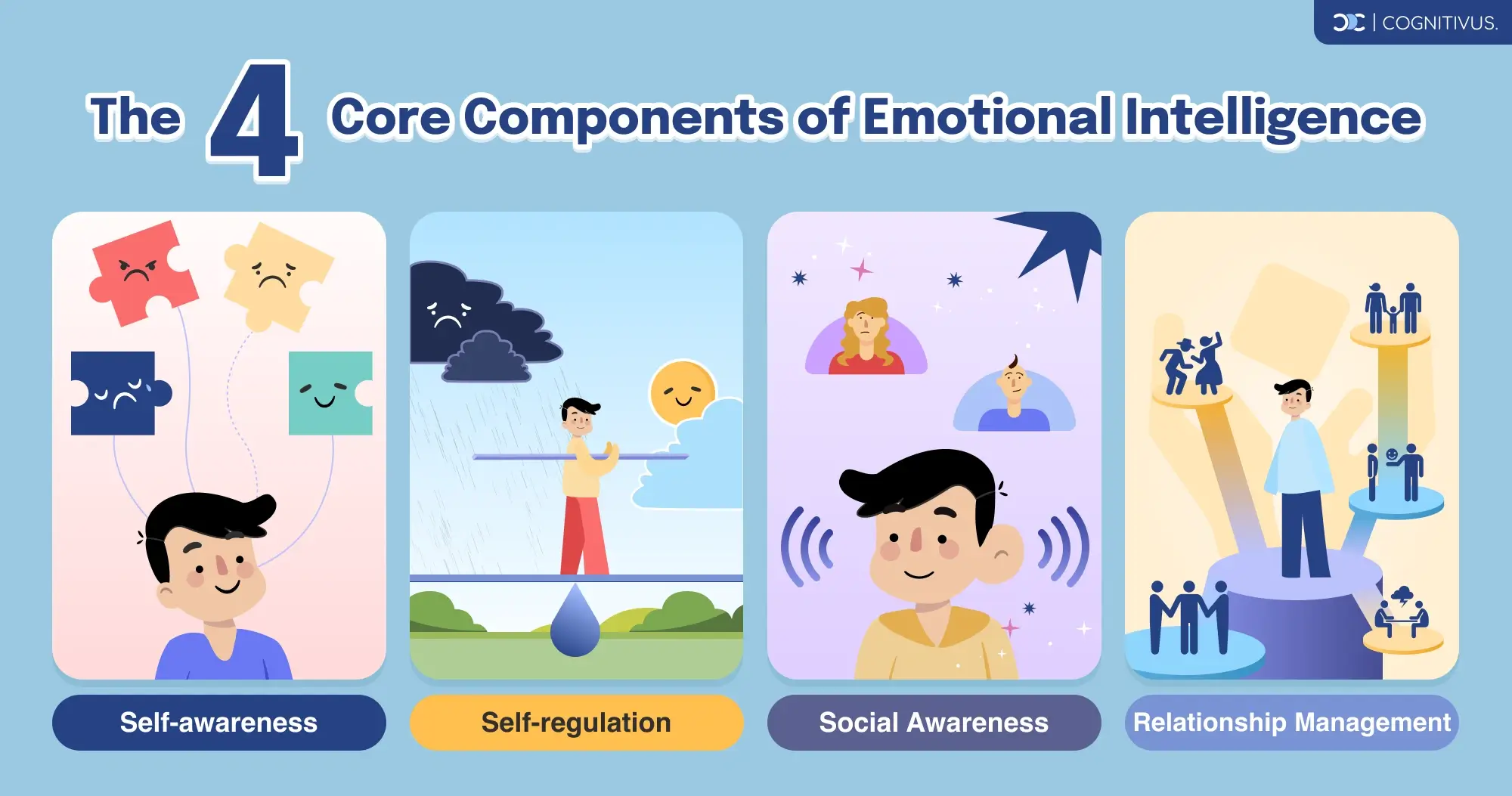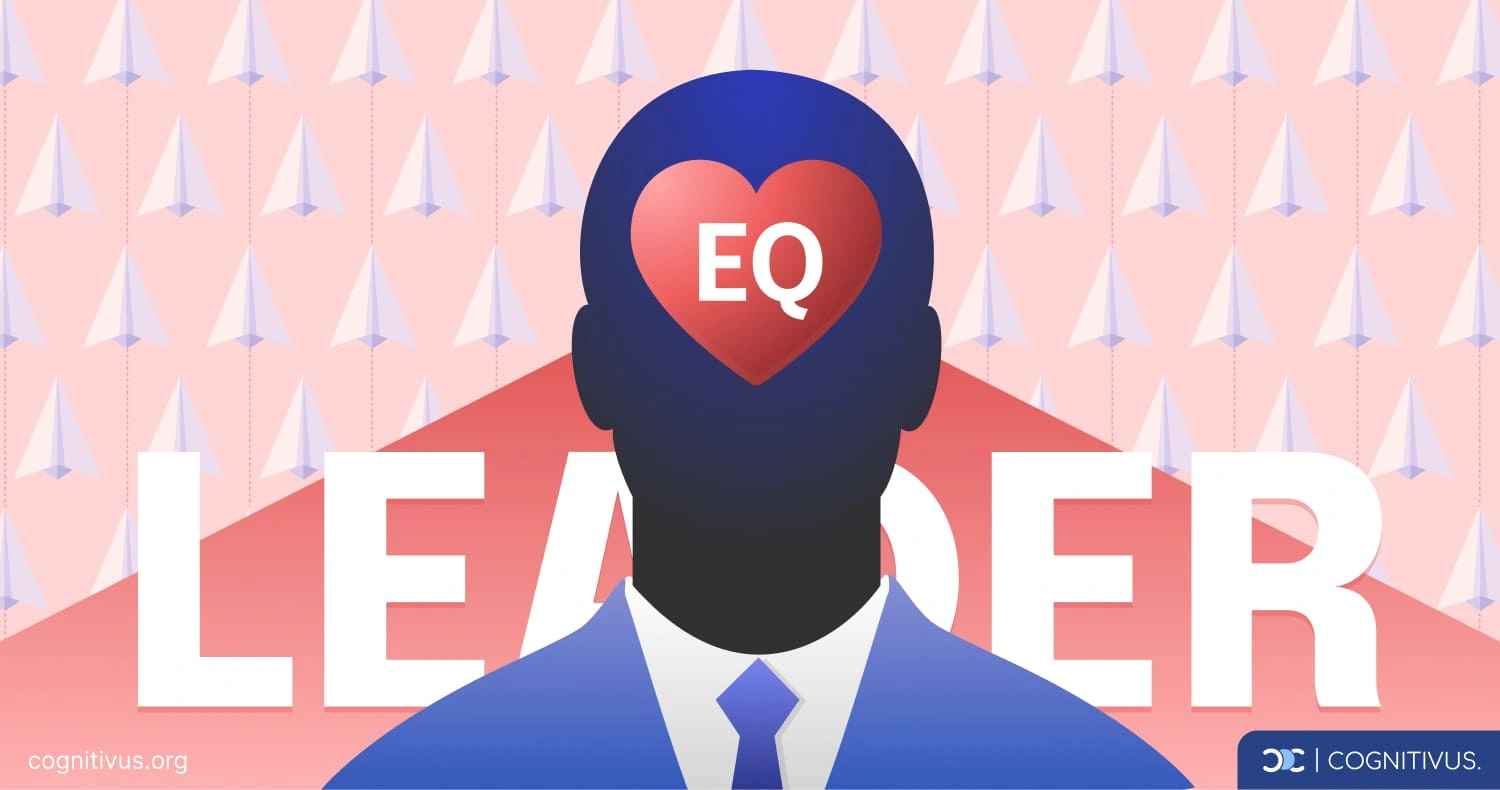Over the last seven years, my career has taken me through all sorts of places – from clinics to classrooms to businesses. It's given me a pretty unique look at what makes a good leader, all through the eyes of psychology.
This journey truly underscored the importance of emotional intelligence for leaders who aim to do more than just call the shots – they genuinely understand their team and connect with them on a deeper level. Emotional intelligence is essential for individual leaders, employees, teams, and organizations as a whole.
In today’s article, we’ll explore how emotional intelligence shapes leadership and why it’s so important.
What Defines an Emotionally Intelligent Leader?
Emotional intelligence (EQ) is a key ingredient in effective leadership. It enables leaders to connect with their teams on a deeper level, fostering understanding, empathy, and collaboration.
Emotional intelligence involves recognizing and managing your own emotions, understanding the emotions of others, and handling relationships wisely and empathetically.
Experts like Daniel Goleman, emphasize that EQ is as crucial as traditional intelligence for success as a leader.
The four core components of emotional intelligence
According to Daniel Goleman, Emotional intelligence boils down to four pillars:

- Self-Awareness: sometimes confused with emotional intelligence itself, self-awareness is about understanding your own emotions, strengths, and weaknesses. Leaders who are self-aware reflect on their feelings and how these affect their decisions and interactions. For example, a leader who notices they are stressed can take steps to manage this before it impacts their team.
- Self-Regulation: This involves controlling your emotions and responses. Leaders who practice self-regulation remain calm under pressure and make thoughtful decisions. This consistency builds trust and reliability within the team.
- Social Awareness: Leaders with social awareness can pick up on the emotions and moods of others. This empathy allows them to connect on a deeper level, fostering a supportive and collaborative environment. For instance, a leader who senses a team member is struggling can offer support before the issue escalates.
- Relationship Management: This focuses on building and maintaining healthy relationships. Leaders skilled in this area use their understanding of emotions to motivate, resolve conflicts, and create a cohesive team. Effective relationship management leads to better communication and teamwork.
Why emotional intelligence is important for leadership
A leader with strong emotional intelligence is what keeps a team together and helps an organization weather the storms. It's a set of skills that never stops growing, making a real difference in the lives of leaders, their teams, and the whole workplace vibe.
Studies highlight the significant impact of emotional intelligence on leadership effectiveness. According to research by Korn Ferry, leaders with high emotional intelligence are better equipped to handle challenges such as employee layoffs or shifts to remote work. They maintain trust and morale, crucial during tough times.
Deloitte’s research also underscores that emotionally intelligent leaders enhance workplace atmosphere and drive success. Leaders proficient in emotional intelligence excel in their responsibilities and cultivate an environment of collaboration and mutual respect.
Similarly, research from Harvard Business School shows how leaders who excel in emotional intelligence build resilient and high-performing teams.
The Benefits of Emotional Intelligence in Leadership
Emotional Intelligence (EI) is what separates okay leaders from truly great ones. As a leader, your awareness of your own emotions and those of others enhances your leadership in many ways:
1. It helps connect with the team
Leaders with high EQ connect with their team members on a human level. They make everyone feel seen and valued, creating an inclusive atmosphere. For example, acknowledging a team member's hard work can boost morale and motivation. When leaders show appreciation for employees' efforts, it fosters a sense of belonging and recognition within the team.
2. It makes you stay calm under pressure
Emotionally intelligent leaders keep their cool in tough situations, helping their team stay focused and positive. In a busy workplace, this calmness can be the difference between chaos and productivity. For instance, during a project crisis, a calm leader can assess the situation and guide their team to find effective solutions without panic.
3. It fosters trust and transparency
Emotionally intelligent leaders are open and honest, which builds trust. They encourage team members to express their concerns and ideas, leading to a more transparent and collaborative environment. When leaders are transparent about challenges and decisions, it helps build trust and fosters open communication, leading to better problem-solving and innovation within the organization.
4. It promotes a positive environment through empathy
Empathy is crucial for understanding and supporting team members. Leaders who show empathy create strong bonds and foster a positive work culture. For example, a leader who listens to a team member's personal struggles and offers flexibility shows that they care. This empathetic approach can reduce stress and increase job satisfaction, leading to higher retention rates and a more engaged workforce.
How to Improve Your Emotional Intelligence Skills as a Leader
Developing your emotional intelligence skills is a continuous journey that enhances leadership effectiveness and personal growth.
Practical tips
Here are a few practical steps to cultivate your emotional intelligence:

- Improve self-awareness
Developing self-awareness starts with reflection and seeking feedback. Understanding your triggers and how they affect your behavior is key. Writing down thoughts and feelings can help identify patterns and areas for improvement.- High EQ phrases to use: "I feel..." to better articulate your emotions.
- Low EQ phrases to avoid: "I don't care." This statement dismisses emotions and shows a lack of engagement.
- Practicing empathy
Empathy involves seeing things from others' perspectives. Sometimes, empathy is mistaken for emotional intelligence itself, but they are not the same. Emotional intelligence is a broader concept that includes several skills, one of which is empathy.
By truly listening and caring about your team’s well-being, you build trust and open communication. For example, considering a colleague's workload before assigning new tasks shows empathy.- High EQ phrases to use: "I understand how you feel..." to show empathy.
- Low EQ phrases to avoid: "You're overreacting." This statement minimizes the other person's feelings and invalidates their emotions.
- Maintaining motivation:
True motivation goes beyond seeking rewards. It’s about passion and resilience. Leaders who love what they do inspire their teams to stay committed even during tough times. Use phrases like "Let's keep going, we're making great progress."- High EQ phrases to use: "Let's keep going, we're making great progress."
- Low EQ phrases to avoid: "Just get it done." This phrase overlooks effort and can demotivate the team.
- Enhancing social skills:
Effective communication and conflict resolution are vital. Clear, respectful interactions ensure that everyone is on the same page and can work together harmoniously.- High EQ phrases to use: "Can we discuss this further?" to encourage open dialogue.
- Low EQ phrases to avoid: "Whatever": This expression dismiss or minimize others' feelings.
Check out our guide for more emotional intelligence words and phrases.
How about emotional intelligence training?
According to a survey reported by Forbes, emotional intelligence is the most sought-after skill for 2024. As a result, organizations ranging from startups and law enforcement, to Fortune 500 companies are taking emotional intelligence training for their staff seriously. By investing in these soft skills, organizations can help leaders handle conflicts, build better relationships, and create highly motivated teams. This approach ultimately leads to a more united and productive workplace.



